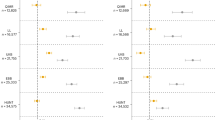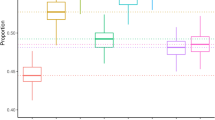Abstract
Recently, the use of a mixed model methodology in genome-wide association studies (GWAS) has been considered effective for controlling population stratification and explaining the polygenic effects of complex traits. However, estimating polygenic variance components and heritability was biased when the mixed model was used. This bias results from a diluted genetic relationship covariance structure, particularly with a limited number of underlying causal variants. We simulated disease and quantitative phenotypes with a variety of heritabilities (0.1, 0.2, 0.3, 0.4, and 0.5), prevalence rates (0.1, 0.2, 0.3, and 0.5), and causal variant numbers (10, 30, 50, and 100). Heritabilities from the simulated data using restricted maximum likelihood were underestimated in many populations (P<0.05). The underestimation increased with a large heritability, a small prevalence, and a small number of causal variants. The underestimation was larger in analyzing disease traits compared with quantitative traits. This study suggests an underestimated heritability in GWAS upon using the mixed model methodology with an excessively larger number of variants versus causal variants.
Similar content being viewed by others
Log in or create a free account to read this content
Gain free access to this article, as well as selected content from this journal and more on nature.com
or
References
Hindorff LA, Sethupathy P, Junkins HA et al: Potential etiologic and functional implications of genome-wide association loci for human diseases and traits. Proc Natl Acad Sci USA 2009; 106: 9362–9367.
Visscher PM, Brown MA, McCarthy MI et al: Five years of GWAS discovery. Am J Hum Genet 2012; 90: 7–24.
Yang J, Manolio TA, Pasquale LR et al: Genome partitioning of genetic variation for complex traits using common SNPs. Nat Genet 2011; 43: 519–525.
Devlin B, Roeder K : Genomic control for association studies. Biometrics 1999; 55: 997–1004.
Price AL, Patterson NJ, Plenge RM et al: Principal components analysis corrects for stratification in genome-wide association studies. Nat Genet 2006; 38: 904–909.
Hoggart CJ, Parra EJ, Shriver MD et al: Control of confounding of genetic associations in stratified populations. Am J Hum Genet 2003; 72: 1492–1504.
Kang HM, Sul JH, Service SK et al: Variance component model to account for sample structure in genome-wide association studies. Nat Genet 2010; 42: 348–354.
Zhang Z, Ersoz E, Lai CQ et al: Mixed linear model approach adapted for genome-wide association studies. Nat Genet 2010; 42: 355–360.
Cho YS, Go MJ, Kim YJ et al: A large-scale genome-wide association study of Asian populations uncovers genetic factors influencing eight quantitative traits. Nat Genet 2009; 41: 527–534.
Yang J, Lee SH, Goddard ME et al: GCTA: a tool for genome-wide complex trait analysis. Am J Hum Genet 2011; 88: 76–82.
Lee SH, Wray NR, Goddard ME et al: Estimating missing heritability for disease from genome-wide association studies. Am J Hum Genet 2011; 88: 294–305.
Girirajan S, Campbell CD, Eichler EE : Human copy number variation and complex genetic disease. Annu Rev Genet 2011; 45: 203–226.
Manolio TA, Collins FS, Cox NJ et al: Finding the missing heritability of complex diseases. Nature 2009; 461: 747–753.
Eichler EE, Flint J, Gibson G et al: Missing heritability and strategies for finding the underlying causes of complex disease. Nat Rev Genet 2010; 11: 446–450.
Gibson G : Rare and common variants: twenty arguments. Nat Rev Genet 2012; 13: 135–145.
Kindt AS, Navarro P, Semple CA et al: The genomic signature of trait-associated variants. BMC Genomics 2013; 14: 108.
Zuk O, Hechter E, Sunyaev SR et al: The mystery of missing heritability: genetic interactions create phantom heritability. Proc Natl Acad Sci USA 2012; 109: 1193–1198.
Zaitlen N, Kraft P : Heritability in the genome-wide association era. Hum Genet 2012; 131: 1655–1664.
Lippert C, Quon G, Kang EY et al: The benefits of selecting phenotype-specific variants for applications of mixed models in genomics. Sci Rep 2013; 3: 1815.
Acknowledgements
We thank the editor and anonymous reviewers for their valuable comments that helped us to improve the original manuscript. We are grateful to the National Institute of Health in Korea for providing the genotypic and epidemiological data to the KARE Analysis Consortium. This study was supported by the Basic Science Research Program of the National Research Foundation of Korea (NRF) funded by the Ministry of Education, Science, and Technology (Grant No. 2012002096).
Author information
Authors and Affiliations
Corresponding author
Ethics declarations
Competing interests
The authors declare no conflict of interest.
Rights and permissions
About this article
Cite this article
Ryoo, H., Lee, C. Underestimation of heritability using a mixed model with a polygenic covariance structure in a genome-wide association study for complex traits. Eur J Hum Genet 22, 851–854 (2014). https://doi.org/10.1038/ejhg.2013.236
Received:
Revised:
Accepted:
Published:
Issue date:
DOI: https://doi.org/10.1038/ejhg.2013.236
Keywords
This article is cited by
-
Discovery and replication of SNP-SNP interactions for quantitative lipid traits in over 60,000 individuals
BioData Mining (2017)
-
Age- and gender-dependent heterogeneous proportion of variation explained by SNPs in quantitative traits reflecting human health
AGE (2015)
-
Warped linear mixed models for the genetic analysis of transformed phenotypes
Nature Communications (2014)



